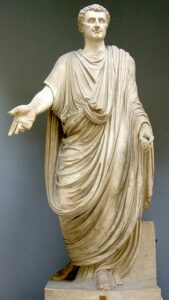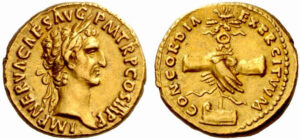Dio Cocceianus, better known as Dio Chrysostom (“golden-mouth”), was born into a wealthy family in Prusa in Bithynia in northwest Asia Minor. He received a good education and was trained in rhetoric, as one would expect given his family background. He moved to Rome during the reigns of Vespasian and Titus, and was trained in Stoic philosophy by Musonius Rufus. He was expelled from Rome by Domitian and adapted to his exile by taking on the persona of a wandering philosopher of the Cynic school (Lendering). He traveled widely throughout the Balkans, Greece, and Asia, going as far north as Borysthenes, near Odessa in Ukraine, and his Oration 36 is a rich source of information about Greeks living north of the Black Sea.

Upon the death of Domitian in 96 CE, his successor Marcus Cocceius Nerva had him recalled to Rome and Dio took on the name of his imperial patron, Cocceianus. In the following year, he delivered Oration 12 “The Olympian” in which he has the sculptor Phidias describe how he created the chryselephantine statue of Zeus, one of the Seven Wonders of the Ancient World. He found favor with the emperor Trajan as well, travelling with him on his campaigns to Dacia. He dedicated four Orations “On Kingship” to Trajan (1-4).
The 80 works attributed to Dio cover a wide range of themes: mythology, ideal kingship, morality, descriptions, addresses to cities, and funeral orations (Browning and Wilson). Two of these works are actually by his student Favorinus (37, 64). His philosophy is eclectic, and his models are Plato, Stoicism, and Cynicism. His biographer Philostratus remarks that Dio displayed excellence in all areas and explains that Dio is a philosopher who has the reputation of a sophist, as one who clothes his philosophical themes with stories and anecdotes (Lives of the Sophists 1.7.487). Dio’s Oration 8 “On Virtue,” for example, makes its philosophical point by presenting the Cynic philosopher Diogenes as a competitor at the Isthmian Games. Finally, Philostratus praises Dio’s straightforward Attic style as “vivid and appropriate to the matter at hand.” His critiques, moreover, are not acrimonious, but “tempered” and “seasoned with benevolence” (Lives of the Sophists 1.7.488). Browning and Wilson concur, noting that Dio “aims at an easy, conversational style, suggestive of improvisation.”

Browning, Robert, and Nigel Guy Wilson. “Dio Cocceianus.” Oxford Classical Dictionary, 3rd ed. rev. Oxford 2003.
Lendering, Jona. “Dio Chrysostom.” Livius.org 10 Oct 2020.